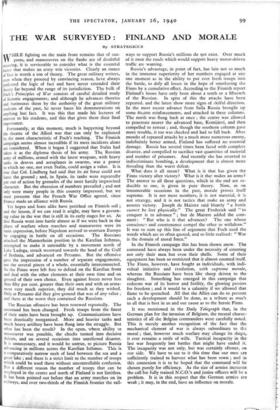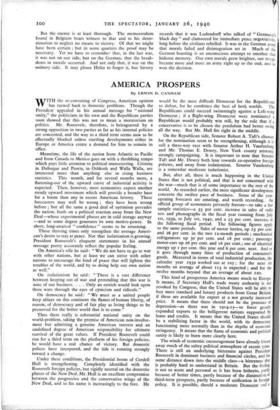THE WAR SURVEYED : FINLAND AND MORALE
By STRATEGICUS
WHILE fighting on the main front remains that of out- posts, and manoeuvres on the flanks are of doubtful meaning, it is serviceable to consider what is the essential factor that makes an army win victories. Clearly an ounce of fact is worth a ton of theory. The great military writers, even when they proceed by convincing reason, h2ve. always preferred the logic of fact and have never extended their theory far beyond the range of its jurisdiction. The bulk of Foch's Principles of War consists of careful detailed study of historic engagements; and although he advances theories and buttresses them by the authority of the great military students of the past, he never bases his demonstrations on anything but fact. It was this that made his lectures of interest to his students, and this that gives them their final importance. Fortunately, at this moment, much is happening beyond the theatre of the Allied war that can only be explained by the most characteristic of Foch's teaching. The Finnish campaign seems almost incredible if its mere incidents alone are considered. When it began I suggested that Stalin had taken it as the diploma thesis of his army. The Russian army of millions, armed with the latest weapons, with heavy tanks in droves and aeroplanes in swarms, was a power to which no one, not even Stalin, could assign a value. It is true that Col. Lindberg had said that its air force could not leave the ground ; and, in Spain, its tanks were repeatedly put out of action by grenades of the most hastily improvised character. But the obsession of numbers prevailed ; and not only were many people in this country impressed, but we must presume that the French War Office agreed, since France made an alliance with Russia.
Yet hopes and fears alike have perished on Finnish soil ; and the lesson, if we can read it aright, may have a govern- ing value in the war that is still in its early stages for us. At first Russia went into battle almost as if we were back in the phase of warfare when marches and manoeuvres were its main expression, before Napoleon arrived to overturn Europe by engaging in battle on all occasions. The Russians attacked the Mannerheim position in the Karelian Isthmus, attempted to make it untenable by a movement north of Lake Ladoga, struck westward towards the head of the Gulf of Bothnia, and advanced on Petsamo. But the offensive gave the impression of a number of separate engagements, not the several pieces of a whole, essentially interconnected. So the Finns were left free to defend on the Karelian front and deal with the other elements at their own time and on ground of their own choice. Even against forces never less than fifty per cent. greater than their own and with an arma- ment very much superior, they did much as they wished. Only at Petsamo did they give ground that was of any value ; and there at the worst they contained the Russians.
The Russian offensive has been renewed repeatedly. The command has been changed. Fresh troops from the finest of their units have been brought up. Communications have been drastically reorganised. More and heavier tanks and much heavy artillery have been flung into the struggle. But what has been the result? In the open, where ability to manoeuvre was possible, the checks turned into decisive defeats, and on several occasions into unrelieved disaster. It is unnecessary, and it would be untrue, to picture Russia advancing in millions across the Karelian Isthmus. This is a comparatively narrow neck of land between the sea and a great lake ; and there is a strict limit to the number of troops which could be used there without uncontrollable confusion. For a different reason the number of troops that can be employed in the centre and north of Finland is not limitless. It has been pointed out before that an army marches on its railways, and over two-thirds of the Finnish frontier the rail- ways to support Russia's millions do not exist. Over much of it even the roads which would support heavy motor-driven traffic are wanting.
Russia's advantage, in point of fact, has lain not so much in the immense superiority of her numbers engaged at any one moment as in the ability to put ever fresh troops into the battle, to defy all losses in the hope of smothering the Finns by a cumulative effect. According to the Finnish report Finland's losses have only been about a tenth or a fifteenth of the Russian. In spite of this the attacks have been repeated, and the latest show more signs of skilful direction. In the most recent advance from Salla Russia brought up some 6o,000 reinforcements, and attacked in three columns. The north was flung back at once ; the centre was allowed to penetrate nearer the advanced base, Kemijarvi, and then compelled to retreat ; and, though the southern column gave more trouble, it too was checked and had to fall back. After months of repeated attacks by a much more numerous enemy, indefinitely better armed, Finland has suffered no essential damage. Russia has several times been faced with complete disaster, and compelled to sacrifice vast quantities of material and number of prisoners. And recently she has resorted to indiscriminate bombing, a development that is almost more revealing than the worst defeat.
What does it all mean? What is it that has given the Finns victory after victory? What is it that makes an army? The answer to all these questions, which in the end are re- ducible to one, is given in pure theory. Now, as on innumerable occasions in the past, morale proves itself supreme. It is not mere numbers, it is not material, it is not strategy, and it is not tactics that make an army and assures victory. Joseph de Maistre said bluntly "a battle cannot be lost physically." The great Frederick said " to conquer is to advance " ; but de Maistre added the com- ment: " But who is it that advances? The one whose conscience and countenance compel the other to withdraw." It was to sum up this line of argument that Foch used the words which are so often quoted, and so little realised: " War is the domain of moral force."
In the Finnish campaign this has been shown anew. The command have always been under the necessity of counting not only their men but even their shells. Some of their equipment has been so restricted that it almost counted itself. The Finns, however, have fought as individuals, with indi- vidual initiative and resolution, with supreme morale, whereas the Russians have been like sheep driven to the slaughter. Something has emerged in this campaign that redeems war of its horror and futility, the glowing passion for freedom ; and it would be a calamity if we allowed that flame to be quenched. All that the Allies can do to prevent such a development should be done, as a tribute as much to all that is best in us and our cause as to the heroic Finns.
It was mentioned in the Daily Telegraph that, in the German plan for the invasion of Belgium, the mental charac- teristics of all the Belgian commanders were carefully noted. This is merely another recognition of the fact that the mechanical element of war is always subordinate to the moral ; that, however much warfare may change its shape, it ever remains a strife of wills. Tactical incapacity in the last war frequently lost battles that might have ended it. The incapacity was not only, but was certainly oftener, on our side. We have to see to it this time that our men are sufficiently trained to harvest what has been sown ; and in this connexion it is to be hoped that the command will be chosen purely for efficiency. As the size of armies increases the call for fully trained N.C.O.'s and junior officers will be a problem. It is in this respect that the German armies are weak ; it may, in the end, have an influence on morale. But the enemy is at least thorough. The memorandum found in Belgium bears witness to that and to his deter- mination to neglect no means to victory. Of that we might have been certain ; but in some quarters the proof may be necessary. Yet we have to remember that, in the last war, it was not on our side, but on the German, that the break- down in morale occurred. And not only that, it was on the military side. It may please Hitler to forget it, but history records that it was Ludendorff who talked of " Germany's black day " and clamoured for immediate peace negotiations, long before the civilians rebelled. It was in the German army that morale failed and disintegration set in. Much of the German boasting is an unconscious attempt to smother that hideous memory. Our own morale grew brighter, our troops became more and more an army right up to the end, and so won the decision.







































 Previous page
Previous page